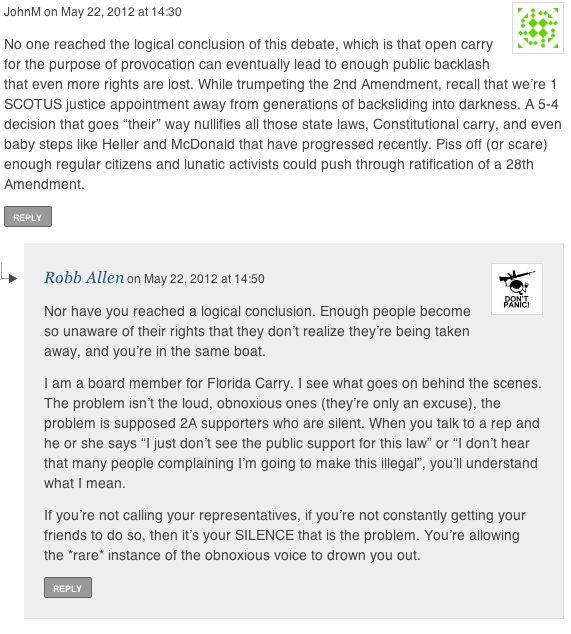In yet another round of evidence that our opponents bet their paychecks on a lame horse, a new Quinnipiac poll is showing that 56% of registered voters in Florida support the law. Along the racial divide, 53% of Hispanics support the law, and 56% of blacks oppose the law. There’s an even more stark division by party:
Meanwhile, support was strongest among Republicans, who supported it 78 percent to 15 percent, while independents supported it 58 percent to 35 percent. A majority of Democrats opposed it: 59 percent to 32
Strong independent support means the law is likely safe from legislative interference, provided gun owners remain vigilant on this matter. But it’s always good to be able to show legislators that polling runs in your favor.
As far as opposition from Blacks goes, I would pose this question collectively to the black community. Who is more likely to end up having to defend themselves with deadly force? A black person who lives in a lousy neighborhood, or a white person who lives in a quiet suburb? Who do you think is more likely to be forced to explain himself in front of a jury, because the prosecutor didn’t want to cut them a break? A middle class white person, who can afford a good attorney, or a poor black person who has to fall back on a public defender? Who’s case of self-defense do you think is likely to be viewed more suspiciously by authorities?
A big reason why I think the Trayvon Martin shooting resonated with the black community is because there’s an underlying, and often correct belief, that blacks don’t get a fair shake from the justice system. But Martin is one case, and I think forming an opinion on one emotionally charged case is short sighted. The fact remains that because of high levels of black-on-black violence, African-Americans are far more likely to need to defend themselves than average. Combine that with a legal system which is reluctance to offer black defendents, particularly poor blacks that can’t afford to hire good attorneys, benefit of doubt, is all the more reason for there to be mechanisms in place to make it more difficult for an ambitious prosecutor to railroad a defendant engaged in a legitimate act of self-defense. As Justice Oliver Wendell Holmes famously said in a judicial opinion upholding Stand Your Ground, that “detached reflection cannot be demanded in the presence of an uplifted knife.”

